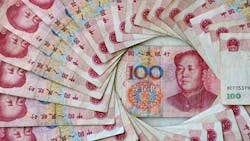Treasury Department Again Says China Not a Currency Manipulator
WASHINGTON -- The United States on Friday said China's currency remains "significantly undervalued" and warned Japan and South Korea against weakening their currencies to gain a trade advantage.
In a twice-yearly finding to Congress on exchange-rate policies, the U.S. Treasury took aim at the country's big Asian trade partners ahead of a series of high-level international meetings in Washington next week.
Taking surprise aim at Tokyo, the Treasury raised questions about Japan's effort to reflate its economy, a move that has sent the yen sharply tumbling to its lowest level since May 2009.
The yen has moved from 77 to the dollar to nearly 100 to the dollar since October.
The Treasury said that Japan's macroeconomic stimulus would be supportive in the short term "but cannot be a substitute for structural reform that raises productivity and trend growth."
It would urge Tokyo to "to remain oriented towards meeting respective domestic objectives using domestic instruments and to refrain from competitive devaluation and targeting its exchange rate for competitive purposes."
As for China, once again, in the face of congressional critics of China's huge bilateral trade advantage, the Treasury declined to officially brand Beijing a currency manipulator, a move that could spark U.S. trade sanctions.
Yuan Remains Underpriced
But it said China's yuan is still underpriced.
"China has taken a series of steps to liberalize controls on capital movements, as part of a broader plan to move to a more flexible exchange rate regime," the Treasury said.
As of early April 2013, it said the yuan, or renminbi (RMB), has appreciated 10% percent against the U.S. dollar since June 2010, when China moved off its exchange rate peg.
When inflation is taken into account, the yuan has appreciated 16.2% from June 2010 through February 2013, the department said.
For that reason, the Treasury said it had concluded that the standard for determining the exchange rate was manipulated to gain an unfair competitive advantage in international trade "has not been met with respect to China."
The Treasury also assailed Seoul for intervening in currency markets.
South Korea has done so with the stated goal of smoothing volatility in the won, it said.
"We will continue to press the Korean authorities to limit their foreign exchange interventions to the exceptional circumstances of disorderly market conditions and to commit to greater foreign exchange market transparency including through the publication of intervention data."
Copyright Agence France-Presse, 2013
About the Author
Agence France-Presse
Copyright Agence France-Presse, 2002-2025. AFP text, photos, graphics and logos shall not be reproduced, published, broadcast, rewritten for broadcast or publication or redistributed directly or indirectly in any medium. AFP shall not be held liable for any delays, inaccuracies, errors or omissions in any AFP content, or for any actions taken in consequence.
